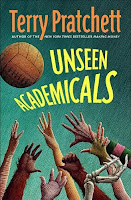 1. Everything That Rises Must Converge, Flannery O'Connor.
1. Everything That Rises Must Converge, Flannery O'Connor.Why I keep trying: Apparently she's important and good. People like her writing; a friend recently saw a bumper sticker that proclaimed "I'd rather be reading Flannery O'Connor." (Anything that inspires a stranger to put a bumper sticker on her car has GOT to be worthwhile... right?)
Sticking point(s): Feeling of obligation, that I Ought To Have Read Flannery O'Connor. Lack of enthusiasm for the much-touted violence and horror in her work. A belief anyway that short stories are like getting kicked in the head.
 2. A Supposedly Fun Thing I'll Never Do Again, David Foster Wallace
2. A Supposedly Fun Thing I'll Never Do Again, David Foster WallaceWhy I keep reading: The essays are funny and interesting.
Sticking point(s): The author is dead, so I won't get any more essays from him. I don't want to waste them. Plus, though... knowing that the author committed suicide makes the anxiety, isolation, and ferocious intelligence in his work less funny / validating, and more sad / alarming. There are many good and moving essays on this exact subject so that's all I'll say about it.
 3. Enslaved by Ducks, Bob Tarte
3. Enslaved by Ducks, Bob TarteWhy I keep reading: I love it! It's laugh-out-loud funny. Also, I can find out exactly what crazy people are thinking without having to talk to them.
Sticking point(s): A before-bed reread. Progress is slow because I go to sleep after a few pages.
 4. Good Dogs Doing Good
4. Good Dogs Doing GoodWhy I keep trying: Essays and true stories about dogs--right up my alley. A friend wrote one of the essays, and I have read it several times, and it is wonderful. I feel that out of loyalty I should read the entire collection.
Sticking point(s): I'm afraid the other essays will read like short stories, and/or that they will be corny. I don't like short stories (see #1).
 5. The Broom of the System, David Foster Wallace
5. The Broom of the System, David Foster WallaceWhy I keep reading: I like David Foster Wallace.
Sticking point(s): I don't really like this book. It's a little ridiculous and uninspiring, as if Pynchon and Updike had a book-baby. I'm embarrassed for it.
 6. Noisy Outlaws, Unfriendly Blobs, and some Other Things That Aren't as Scary, Maybe, Depending on How You Feel About Lost Lands, Stray Cellphones, Creatures from the Sky, Parents Who Disappear in Peru, a Man Named Lars Farf, and One Other Story We Couldn't Quite Finish, So Maybe You Could Help Us Out.
6. Noisy Outlaws, Unfriendly Blobs, and some Other Things That Aren't as Scary, Maybe, Depending on How You Feel About Lost Lands, Stray Cellphones, Creatures from the Sky, Parents Who Disappear in Peru, a Man Named Lars Farf, and One Other Story We Couldn't Quite Finish, So Maybe You Could Help Us Out.Why I keep reading: The story in here by Nick Hornby is my favorite short story. Ever. I love it. It is my exception to #1.
Sticking point(s): I haven't read any of the other stories; I just keep re-reading my favorite.
 7. The Elements of Style (Illustrated), Strunk and White.
7. The Elements of Style (Illustrated), Strunk and White.Why I keep reading: It's interesting and clears up many matters. It's got pictures.
Sticking point(s): More of a reference book than a page-turner.
CONCLUSIONS: The following book would be tailor-made for me to get stuck on: A sad or alarming book of short stories that I feel obligated to read, which I attempt to read before bed and do not enjoy.
Actually, except for the read-before-bed part, that EXACTLY describes Everything that Rises Must Converge. It will be converging with other books from the area, back where I got it at The Bookstore Where Books Are A Dollar. Hope its next owner has a different Stuckage List than my own.







